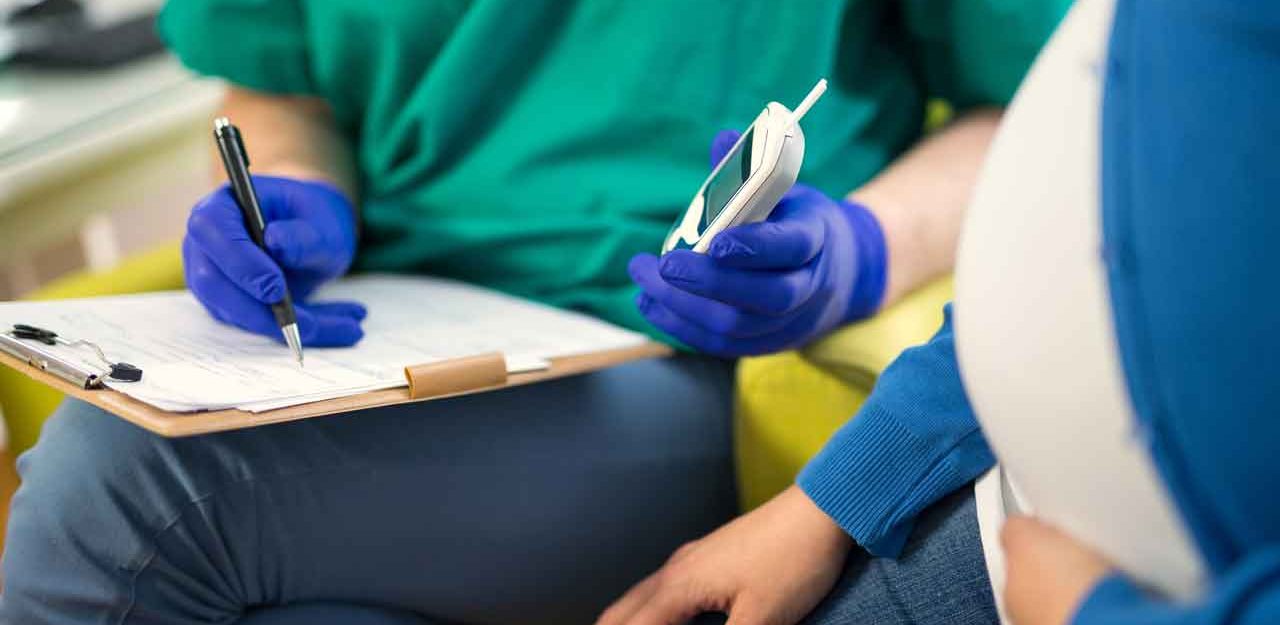Gestational Diabetes Can Have Later Consequences

Gestational diabetes develops during pregnancy and usually disappears after you give birth — but later health consequences to mom and child can be serious.
If you’ve never been diagnosed with diabetes, you may assume diabetes is nothing to worry about when you become pregnant. But one form of the condition, gestational diabetes, only develops when women are expecting, and the health consequences can impact the health of both the mom-to-be and her baby — possibly, for years to come.
If you are planning on getting pregnant, it’s important to understand what causes gestational diabetes is because there are steps you can take to lower your risk of developing the condition. As with type 1 and type 2 diabetes, gestational diabetes is marked by abnormally high blood glucose (also called blood sugar). It develops during pregnancy when a woman’s body isn’t making enough blood glucose-regulating insulin, a hormone produced by the pancreas, or cells do not absorb glucose effectively — a condition known as insulin resistance.
YOU MIGHT ALSO LIKE: Understanding Blood Sugar During Pregnancy
High levels of other hormones impair the action of insulin somewhat when you are pregnant, so it’s normal to have a modest rise in blood sugar after meals when you are expecting. But for about seven percent of moms-to-be, blood sugar levels spike too high — that’s what causes gestational diabetes to develop, usually in late pregnancy.
Doctors screen pregnant women for gestational diabetes with blood tests to measure glucose levels. It’s the only way to know for sure you’ve developed the condition because there are often no obvious symptoms of gestational diabetes, or only mild ones, although some pregnant women may be excessively thirsty and fatigued. Blurred vision and excessive urination can also be symptoms of gestational diabetes, according to the National Institute for Diabetes and Digestive and Kidney Diseases (NIDDK).
There are some risk factors for gestational diabetes you can’t change, including having close relatives with type 2 diabetes, having gestational diabetes during a previous pregnancy or having polycystic ovary syndrome (a condition marked by a hormone imbalance). Fortunately, however, the main risk factors — being overweight and gaining too many pounds during pregnancy — can be controlled.
By achieving a healthy weight before you are expecting, you may not only avoid gestational diabetes but also lower your risk for later consequences of gestational diabetes developing down the road.
For example, a study from the University of Tampere in Finland found women who were overweight before pregnancy and diagnosed with gestational diabetes were at increased risk of developing metabolic syndrome even seven years after their pregnancy. Metabolic syndrome, comprised of a cluster of symptoms including high blood pressure, high blood sugar, excess body fat around the waist, and unhealthy levels of cholesterol, raises the risk for heart disease, stroke, and type 2 diabetes.
A University of Michigan study of 1,000 young women found those who were overweight before becoming pregnant were more likely to gain excessive weight during pregnancy and be diagnosed with gestational diabetes. The University of Michigan researchers pointed out unhealthy weight gain while pregnant also increases the odds of developing obesity, high blood pressure, and heart disease and places babies at risk, too, for obesity and heart disease in the future.
If you are diagnosed with gestational diabetes, there’s no need to panic. Most of the time gestational diabetes can be controlled and treated during pregnancy, so you and your baby will have the best outcome. However, it’s crucial to carefully follow your doctor’s instructions about weight gain, diet, and treatment to avoid later consequences of gestational diabetes. Untreated gestational diabetes is associated with potentially serious problems for moms and babies, according to the March of Dimes.
For example, gestational diabetes can cause preeclampsia, a potentially dangerous condition marked by high blood pressure and damage to other organ systems. Babies born to moms with gestational diabetes may weight 9 lbs or more, due to their exposure to excess glucose in the womb — this can result in preterm births and a need for a cesarean birth (c-section). Gestational diabetes can also cause health complications for your baby after birth, including low blood sugar, breathing problems, low blood sugar and jaundice from liver problems.
YOU MIGHT ALSO LIKE: Mom's Weight after Giving Birth Tied to Overweight Kids
Updated:
April 08, 2020
Reviewed By:
Janet O’Dell, RN